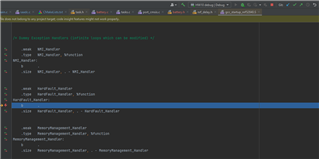Hello, I'm getting started with FreeRTOS in Nordic SDK 15.3
I have created a small test code, using binary Semaphore from FreeRTOS, that waits signal from SAADC callback. I also use SDK timer module to setup continuous ADC sampling via PPI
However, I found that the code stucks in PendSV handler, sometimes from Semaphore wait function sometimes earlier.(see pictures). Used same config as in blinky freertos example.
My question is should I use it inside tasks only, or it actually should work.
int main(void)
{
(void)NRF_LOG_INIT(NULL);
NRF_LOG_DEFAULT_BACKENDS_INIT();
// spim_init();
//
// ext_flash_init();
drv_saadc_init();
comp_battery_init();
drv_saadc_sampling_start();
start_up_reason();
NRF_LOG_INFO("\r\nBAt example started.\r\n");
while (true)
{
nrf_delay_ms(1000);
(void)comp_battery_get_soc();
}
}
void comp_battery_init(void)
{
// Configure BATTERY_ENABLE_PIN and CHARGE_CONTROL_PIN
nrf_gpio_cfg_output(BATTERY_ENABLE_PIN);
nrf_gpio_cfg_output(BAT_ADC_EN);
/* Create a binary semaphore without using any dynamic memory
allocation. The semaphore's data structures will be saved into
the xSemaphoreBuffer variable. */
bat_semaphore = xSemaphoreCreateBinaryStatic(&bat_SemaphoreBuffer);
/* The pxSemaphoreBuffer was not NULL, so it is expected that the
handle will not be NULL. */
configASSERT(bat_semaphore);
drv_saadc_register_user_cb(ADC_4V2, battery_adc_cb);
battery_connection(CONNECTED);
}
uint8_t comp_battery_get_soc(void)
{
uint16_t soc_mapped = 0;
static uint32_t soc_sum = 0;
static int32_t bat_vol_prev = 0;
if (xSemaphoreTake(bat_semaphore, (TickType_t) 100) == pdTRUE)
{
/* SOC code here
}
else
{
NRF_LOG_DEBUG("FAILED TO GET SEMAPHORE");
}
return bat_soc;
}
/*************************************************************************************
* @brief Briefly explain what function does
* @param Describe input params and their limitations
* @retval Describe return param
**************************************************************************************/
static void battery_adc_cb(int32_t adc_converted_results)
{
static BaseType_t xHigherPriorityTaskWoken = pdFALSE;
xHigherPriorityTaskWoken = pdFALSE;
/* Unblock the task by releasing the semaphore. */
xSemaphoreGiveFromISR(bat_semaphore, &xHigherPriorityTaskWoken );
current_battery_voltage = (uint16_t )adc_converted_results;
}




